
 The late Blake Edwards is probably one of the last filmmakers you’d ever think would dip his toes into the murky waters of post-modernism, but it’s impossible not to notice the meta qualities of S.O.B. (we’re told it stands for “Standard Operational Bullshit”), his ode to the crass insanities of the filmmaking industry.
The late Blake Edwards is probably one of the last filmmakers you’d ever think would dip his toes into the murky waters of post-modernism, but it’s impossible not to notice the meta qualities of S.O.B. (we’re told it stands for “Standard Operational Bullshit”), his ode to the crass insanities of the filmmaking industry.
How else would you describe a movie about a filmmaker who attempts to create a hit by baring the breasts of his movie-star wife — a famous paragon of onscreen innocence and virtue — that just happened to be made by a filmmaker who was attempting to create a hit by baring the breasts of his movie-star wife, who just happened to be Maria Von Trapp and Mary Fucking Poppins?
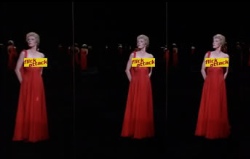 Unlike the film within the film, the sight of Julie Andrews’ breasts didn’t cause anyone to rush to the box office, but that doesn’t mean S.O.B. isn’t a classic satire of early ’80s Hollywood culture. While occasionally overly broad and at least 30 minutes too long (I would have cut most of the last 20 minutes and everything to do with Loretta Swit’s gossip columnist), the movie is often laugh-out-loud funny and features an amazing cast doing what they do best.
Unlike the film within the film, the sight of Julie Andrews’ breasts didn’t cause anyone to rush to the box office, but that doesn’t mean S.O.B. isn’t a classic satire of early ’80s Hollywood culture. While occasionally overly broad and at least 30 minutes too long (I would have cut most of the last 20 minutes and everything to do with Loretta Swit’s gossip columnist), the movie is often laugh-out-loud funny and features an amazing cast doing what they do best.
This includes William Holden, appearing as a slightly happier version of the same character he played in the similarly themed Network; Richard Mulligan as the crazed producer who decides to transform his G-rated flop into a X-rated hit; a young Rosanna Arquette, who doesn’t say or do much, but who is braless and topless just long enough to earn a mention; and Robert Preston, who easily steals the show as the laid-back physician who’s seen it all at least twice, and done it himself at least once.
And, because you are wondering, despite the fact that Julie Andrews was 46 when the movie was made, they’re real and they’re spectacular. —Allan Mott

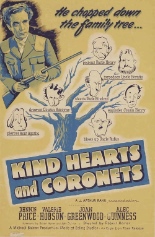
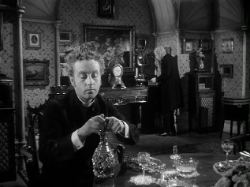 As played by Dennis Price, Louis Mazzini is so upfront and charming about his crimes and his reasons for committing them that it’s only in retrospect you realize there might be something wrong with him. It’s easy to imagine yourself in his place, doing exactly the same thing. The only reason he isn’t considered one of the greatest villains in film history is because writer/director Robert Hamer so expertly presents him as its hero, it’s impossible to think of him as anything else.
As played by Dennis Price, Louis Mazzini is so upfront and charming about his crimes and his reasons for committing them that it’s only in retrospect you realize there might be something wrong with him. It’s easy to imagine yourself in his place, doing exactly the same thing. The only reason he isn’t considered one of the greatest villains in film history is because writer/director Robert Hamer so expertly presents him as its hero, it’s impossible to think of him as anything else.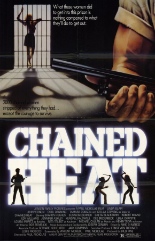
 Already convinced by previous viewings that
Already convinced by previous viewings that 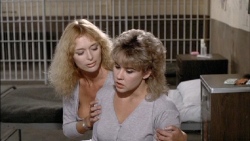 And Chained Heat? It tells the story of the misery and corruption found in a women’s prison that focuses on characters like Carol Henderson (Linda Blair), an otherwise law-abiding everywoman who ran over and killed a man by accident; Ericka (Sybil Danning), a cruel, dangerous Aryan who sets her sights on Carol’s ass and tries to make it her own; and Duchess (Tamera Dobson), the Vassar-educated queen bee of the prison’s (frequently mentioned, but largely unseen) black prison population.
And Chained Heat? It tells the story of the misery and corruption found in a women’s prison that focuses on characters like Carol Henderson (Linda Blair), an otherwise law-abiding everywoman who ran over and killed a man by accident; Ericka (Sybil Danning), a cruel, dangerous Aryan who sets her sights on Carol’s ass and tries to make it her own; and Duchess (Tamera Dobson), the Vassar-educated queen bee of the prison’s (frequently mentioned, but largely unseen) black prison population.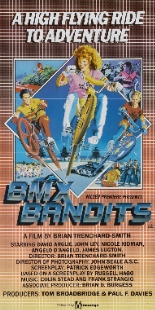
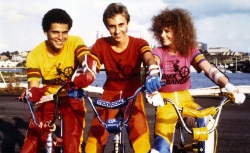 Nicole Kidman stars as Judy, a 16 year-old BMX enthusiast who — along with her friends P.J. and Goose — gets caught up with bank robbers when the three of them “find” (that is to say, steal) the box of special walkie-talkies the (other, older) thieves need for their daring robbery. When the thieves kidnap Judy, P.J. and Goose band together with their town’s BMX-loving teens, bring down the bad guys and use the reward money to build the bike track of their dreams.
Nicole Kidman stars as Judy, a 16 year-old BMX enthusiast who — along with her friends P.J. and Goose — gets caught up with bank robbers when the three of them “find” (that is to say, steal) the box of special walkie-talkies the (other, older) thieves need for their daring robbery. When the thieves kidnap Judy, P.J. and Goose band together with their town’s BMX-loving teens, bring down the bad guys and use the reward money to build the bike track of their dreams.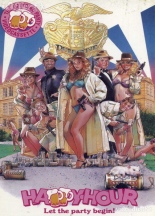
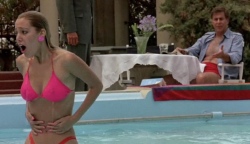 Recognizable TV character actor Richard Gilliland stars as a chemist who accidentally discovers an additive that makes Marshall Beer dangerously addictive. The promotion that results enrages his lab partner/ex-girlfriend, prompting her to steal half of the formula and take it to Marshall’s largest competitor. Little, who limits himself to just one (terrible) Cary Grant impression, is the James Bond-like spy hired to steal the formula from Marshall, while sleazy scumbag Farr and his psycho partner Kitaen (in a clear bit of typecasting) are tasked to steal the formula from Marshall’s competition.
Recognizable TV character actor Richard Gilliland stars as a chemist who accidentally discovers an additive that makes Marshall Beer dangerously addictive. The promotion that results enrages his lab partner/ex-girlfriend, prompting her to steal half of the formula and take it to Marshall’s largest competitor. Little, who limits himself to just one (terrible) Cary Grant impression, is the James Bond-like spy hired to steal the formula from Marshall, while sleazy scumbag Farr and his psycho partner Kitaen (in a clear bit of typecasting) are tasked to steal the formula from Marshall’s competition.